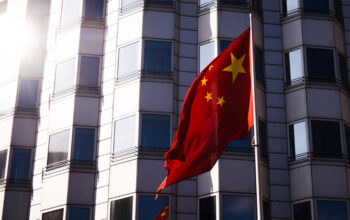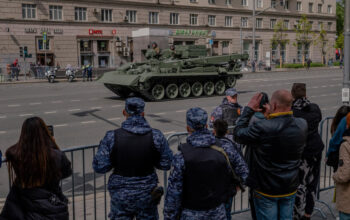
We’re covering Vladimir Putin’s decision to recognize the independence of separatist regions of Ukraine and the reopening of tourism in Australia.
Russia recognizes separatist regions, escalating tensions
In a fiery speech filled with historical grievances, President Vladimir Putin said on Monday that Russia would recognize the independence of Donetsk and Luhansk, territories in Ukraine controlled by Moscow-backed separatists. Western leaders fear the move could lead to one of the biggest conflicts in Europe since World War II.
Putin’s decision followed a session of the Russian Security Council at which he accused the U.S. and its allies of using Ukraine “as an instrument of confrontation” with Russia. Ukrainian officials warned that the recognition could allow separatist leaders to request military help from Russia, possibly paving the way for a military offensive.
Also on Monday, the Russian news media broadcast claims of assaults by Ukrainian forces, charges that Ukrainian military leaders forcefully denied. American officials have repeatedly predicted that the Russian military would stage false attacks on their own forces as a pretext for war.
The escalations cast doubt over diplomatic solutions. President Biden had agreed on Sunday “in principle” to a proposed summit with Putin, but White House officials said that such a meeting in the coming days was “notional” at best and would not happen if Russia were to invade. Here’s the latest.
Arab rulers stashed millions in Swiss bank
A data leak from the bank Credit Suisse has opened a peephole into the private wealth of several powerful figures across the Middle East, raising new questions about self-dealing.
The leak revealed that current and former leaders in the region, which has long lacked transparency of politicians’ financial holdings, have held sizable fortunes in foreign banks. Experts said it showed the failure of many states to create boundaries between the rulers’ and the state’s assets.
The only sitting head of state in the leaked data was King Abdullah II of Jordan, a close U.S. partner whose kingdom has received at least $22 billion in military and economic aid from the Americans. According to the data, King Abdullah had six Swiss accounts, including one that held more than $224 million in 2015.
A few years earlier, before President Hosni Mubarak of Egypt was ousted during an Arab Spring uprising in 2011, a circle of businessmen close to him, as well as his sons, acquired vast fortunes. The Mubarak brothers held six accounts at Credit Suisse, including a joint account that swelled to about $196 million in 2003.
What the leak shows: Credit Suisse missed or ignored red flags by opening accounts for and continuing to serve people whose problematic backgrounds would have been obvious to anyone who ran their names through a search engine.
Australia celebrates its first tourists in two years
Lifeguards, drag queens and a D.J. greeted the first wave of foreign tourists entering Australia since March 2020, when the country shut its borders to keep the coronavirus at bay.
More than 50 international flights were scheduled to fly into Australia on Monday, which officials celebrated as Australia’s reopening to the world. Despite a surge in Omicron-linked Covid cases and deaths over the last two months, Australia’s shift to policies that are aimed at living with the virus matches that of a growing portion of Asia.
“It’s been a party out here at Sydney airport; everyone is celebrating,” Dan Tehan, Australia’s minister for tourism, said.
Still, it’s unclear how long it will take the tourism industry to fully rebound. Questions remain over whether travelers from China, Australia’s biggest tourism market, will return. And the U.S. and New Zealand have recommended against traveling to Australia because of its recent Omicron outbreak.
In other pandemic developments:
THE LATEST NEWS
Around the World
Hundreds of part-time workers across India risk their lives for a frontline job that is vital for preserving nature but often pays less than minimum wage: forest ranger. They battle poachers, criminal gangs and fires — and in Kerala, which has the largest contiguous tiger population in the world, they are the de facto peacekeepers between humans and wildlife.
ARTS AND IDEAS
A piece of American food history
The Ebony test kitchen is singular, with swirls of orange and green and a futuristic design. Built in the early 1970s, the kitchen cemented Ebony magazine’s place in American food culture.
A leading magazine for Black America since the 1940s, Ebony helped transform the public’s perception of Black food. Freda DeKnight, Ebony’s first food editor, traveled across the U.S. learning different culinary traditions from home cooks and shared her findings in a monthly column. International recipes like rose petal pudding and mulligatawny soup lived alongside traditional fare like Ebony’s stewed chicken and dumplings. Readers could submit cherished family recipes to be tested by professionals, and the magazine featured the winning recipes.
“So many people looked to Ebony for recipes that they were familiar with, or had been part of our culture,” Charlotte Lyons, a former food editor at Ebony, said. “We would bring all of that stuff to life.” The restored kitchen is the centerpiece of a new exhibition in Harlem focused on the African American food experience.


